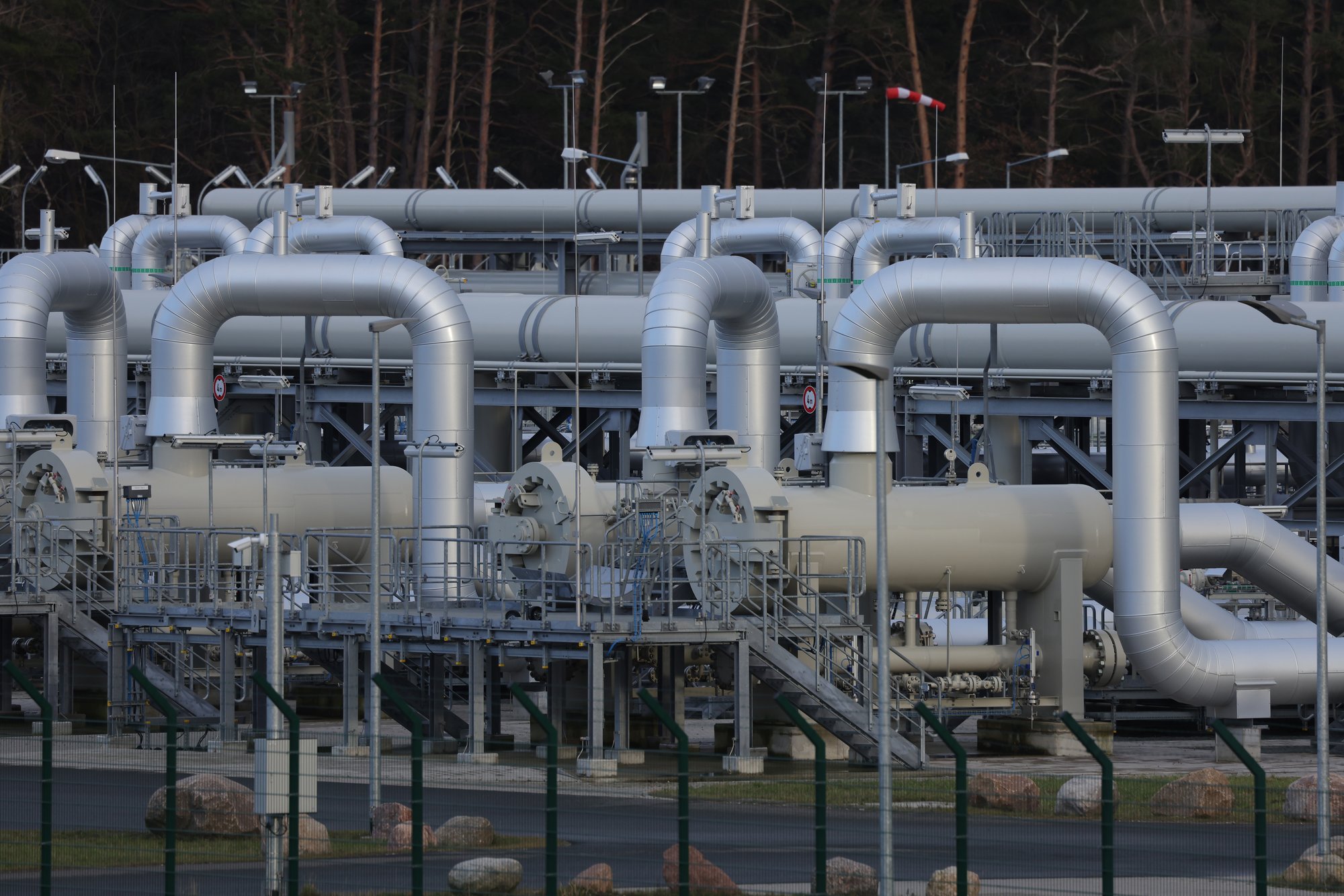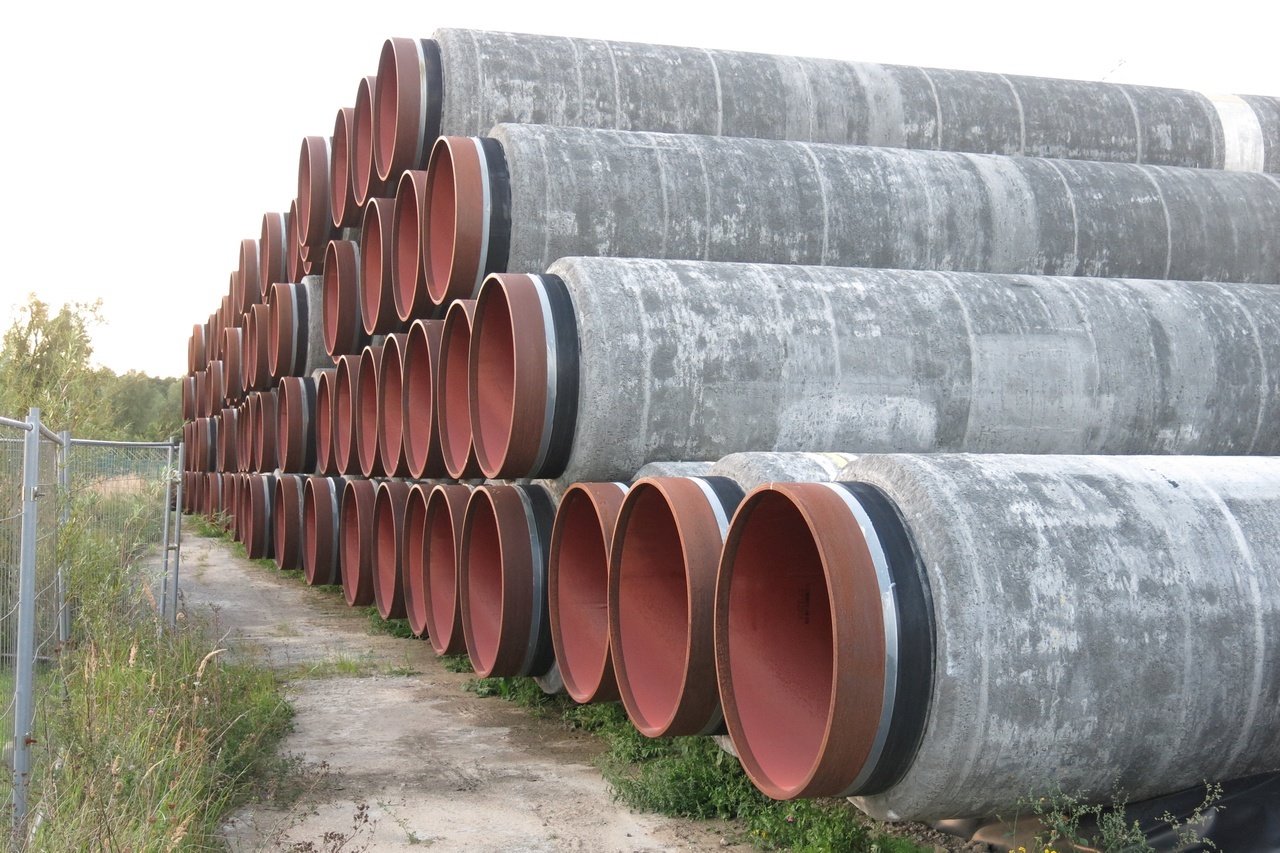After Ukraine Punches Back, Moscow Goes for Europe’s Gas Pipeline Jugular

Nord Stream 2, a gas pipeline running from Russia to Germany, is on pause because of the war in Ukraine. Photo by Sean Gallup/Getty Images.
KYIV, Ukraine — With Russian forces slowly losing ground along the entire front line in Ukraine, Moscow has closed the spigots on a key gas pipeline to Europe in a gambit to extort sanctions relief and derail Kyiv’s lifeline of Western military aid.
Moscow said Monday, Sept. 5, that the Nord Stream 1 pipeline, which previously supplied about one-third of Europe’s natural gas, would remain closed until the West drops its Ukraine-related sanctions on Russia. The news sent European gas prices soaring and deepened fears of a recession.
“Europe was already facing a very tough winter, but with this announcement, we are facing a winter of pure war,” Swedish Prime Minister Magdalena Andersson said about Russia's Nord Stream 1 closure, multiple agencies reported.
Moscow sees the coming winter as an opportunity to exploit its European energy influence and inflict economic pain against Ukraine’s Western backers. Kyiv, for its part, has capitalized on the remaining warm weather to mount multiple counterattacks against Russian occupation forces in the past week.
After weeks of largely static warfare, this marks a sea change in the war’s overall dynamic, with Ukrainian forces now fighting to retake the initiative. Those Ukrainian counteroffensives also send a reassuring message to Western backers that Ukraine can indeed defeat Russia on the battlefield, and the coming energy war with Moscow will not be for a lost cause.
Anticipating the potential risk to Ukraine’s vital Western economic and military assistance lifelines, Ukrainian President Volodymyr Zelenskyy condemned Russia’s “decisive energy attack on all Europeans.”
“Russia wants to destroy the normal life of every European — in all countries of our continent,” Zelenskyy said in a video address on Sept. 3. “It wants to weaken and intimidate the entire Europe, every state. Where Russia cannot do it by force of conventional weapons, it does so by force of energy weapons.”
Over the summer, Russia’s state-owned gas company, Gazprom, blamed maintenance issues for several shutdowns of the Nord Stream pipeline. On Friday, Gazprom blamed a gas leak for Nord Stream's latest, indefinite shutdown. On Monday, Kremlin officials demanded Western sanctions relief in order to resume gas flow through the undersea pipeline.
“Problems in pumping arose because of the sanctions imposed against our country and against a number of companies by Western states, including Germany and the [United Kingdom],” Kremlin spokesman Dmitry Peskov said Monday, the Russian news agency Interfax reported.

Stacks of pipes for the Nord Stream 2 natural gas pipeline at Germany's Mukran port, September 2020. Photo by Pedant01 via Wikimedia Commons.
Until last year, Russia supplied about 40% of the European Union’s natural gas deliveries. That share dropped by roughly two-thirds after the full-scale invasion of Ukraine in February. Still, thanks to soaring fossil fuel prices, Russia has reaped enormous revenue from its natural gas sales this year.
According to the Center for Research on Energy and Clean Air, or CREA, a Finnish research group, Moscow has made roughly $158 billion in gas sales revenue since the Feb. 24 invasion. Of that number, more than half — about $85 billion — came from gas sales to European countries, many of which were simultaneously sending military support to Ukraine.
“Fossil fuel exports have contributed approximately EUR 43 billion to Russia’s federal budget since the start of the invasion, helping fund war crimes in Ukraine,” CREA reported on Sept. 6.
The Nord Stream shutdown comes amid Ukrainian counteroffensives in the past week against Russian forces at key locations in southern and eastern Ukraine.
After weeks of stalemated combat along a relatively static front line, Ukrainian units attacked Russian occupation forces in Ukraine’s Kherson region last week. This week, Ukrainian units launched a surprise attack in the eastern Kharkiv region, reportedly gaining back ground in the city of Balakliya.
According to other unconfirmed reports, Ukrainian forces have also advanced into the village of Stariy Karavan on the bank of the Siversky Donets River. If true, Ukrainian forces will have gained a key bridgehead.
On Wednesday, Ukrainian social media channels and independent journalists also reported an attack against Russian forces in the city of Kupyansk, marking a potential bellwether for follow-on attacks in the surrounding region.
Although Ukraine’s military has maintained a media blackout to preserve operational security, both Russian and Ukrainian social media channels have offered evidence of potentially high Russian casualties, as well as widespread Ukrainian advances across the eastern front.
Kyiv likely intends to batter Russian forces ahead of winter, thereby weakening the strength of any renewed Russian offensives in 2023. And with Ukraine’s overall war effort contingent on the steady flow of Western military aid, Kyiv also wants to send a reassuring message to its European backers before the economic pain of a wintertime energy war with Moscow is fully felt, defense expert Jack Watling wrote in a recent piece for the Royal United Services Institute, or RUSI, a British think tank.
According to Watling, Kyiv’s Kherson counteroffensive was likely inspired by several key factors, including “a political demand to demonstrate to Ukraine’s international partners that the donation of equipment leads to progress on the battlefield ahead of a challenging winter in which many states will be seeking to curtail expenditure.”
Since the breakup of the Soviet Union in 1991, Russia often leveraged its power over Ukraine through the energy economy — particularly, by reducing gas supplies in winter. Following Russia’s 2014 invasion, Ukraine weaned off Russian gas the following year in favor of supplies routed from the EU.
The EU pledged to reduce its reliance on Russian gas after the 2014 invasions of eastern Ukraine and Crimea. Yet, Europe's Russian gas imports actually increased by some 25% from 2014 to 2019.
With gas prices now soaring in the wake of Russia’s Nord Stream closure, the EU has proposed capping Russian gas prices.
"We must cut Russia's revenues which Putin uses to finance this atrocious war," European Commission President Ursula von der Leyen said Wednesday, adding: "These are tough times, and they're not over soon.”
In response, Russian President Vladimir Putin threatened to completely cut off Russian gas exports to Europe.
"We will not supply anything at all if it is contrary to our interests," Putin said during an economic forum on Wednesday in the far eastern Russian city of Vladivostok. "No gas, no oil, no coal, no fuel oil, nothing."
Read Next: ‘Bug-Out Bags’ and Bomb Shelters: It’s Back to School in Wartime Ukraine

BRCC and Bad Moon Print Press team up for an exclusive, limited-edition T-shirt design!
BRCC partners with Team Room Design for an exclusive T-shirt release!
Thirty Seconds Out has partnered with BRCC for an exclusive shirt design invoking the God of Winter.
Lucas O'Hara of Grizzly Forge has teamed up with BRCC for a badass, exclusive Shirt Club T-shirt design featuring his most popular knife and tiomahawk.
Coffee or Die sits down with one of the graphic designers behind Black Rifle Coffee's signature look and vibe.
Biden will award the Medal of Honor to a Vietnam War Army helicopter pilot who risked his life to save a reconnaissance team from almost certain death.
Ever wonder how much Jack Mandaville would f*ck sh*t up if he went back in time? The American Revolution didn't even see him coming.
A nearly 200-year-old West Point time capsule that at first appeared to yield little more than dust contains hidden treasure, the US Military Academy said.












